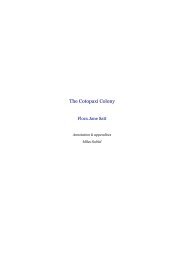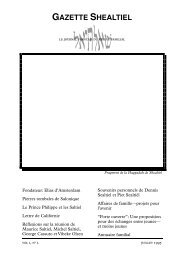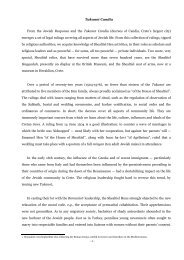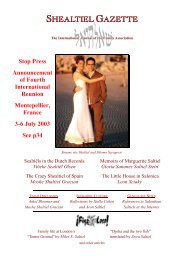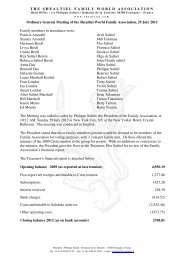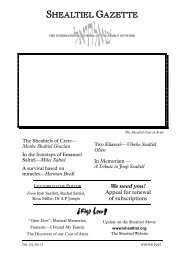Gazette Vol 1 No 4 - The Shealtiel Family Worldwide
Gazette Vol 1 No 4 - The Shealtiel Family Worldwide
Gazette Vol 1 No 4 - The Shealtiel Family Worldwide
Create successful ePaper yourself
Turn your PDF publications into a flip-book with our unique Google optimized e-Paper software.
december 1995 SHEALTIEL GAZETTE vol i no iv<br />
Book review: Willing to wound but afraid to strike<br />
“<strong>The</strong> Sacred Chain”by <strong>No</strong>rman Cantor<br />
This deliberately combative reexamination<br />
of Jewish history<br />
cannot fail to rouse the<br />
reader— no matter his point of<br />
view— and is more likely than<br />
not to leave him infuriated.<br />
Cantor who is Professor of History<br />
at nyu, gives the impression<br />
of being willing to take on<br />
anyone, but for all of the book’s<br />
bellicosity, he seems to flinch at<br />
the last fence from the implications<br />
of his point of view.<br />
<strong>The</strong> thrust of Cantor’s book is<br />
that the study of Jewish history<br />
has been clouded by the central<br />
character of religious faith in<br />
the definition of Jewry. <strong>No</strong>t until<br />
the nineteenth century was<br />
the apparatus of critical scholarship<br />
applied to Jewish history<br />
and its results have challenged<br />
much of what Jews have told<br />
themselves about their history<br />
over the two millennia of the<br />
Diaspora. For example, Cantor<br />
concludes that the evidence is<br />
wholly lacking for the Biblical<br />
account prior to David— the<br />
first character in Jewish history<br />
to be confirmed by independent<br />
evidence. This is particularly<br />
disappointing for those<br />
who had hoped that the archaeological<br />
record would support<br />
the Mosaic account.<br />
Cantor proceeds to take on a<br />
wide range of adversaries: the<br />
slipshod practitioners of Jewish<br />
history, whom he sees as enfeebled<br />
by their reluctance to challenge<br />
rabbinical shibboleths;<br />
the State of Israel, whose Zionist<br />
claims he contrasts unfavourably<br />
with its economic dependency;<br />
the secular leaders of<br />
the Diaspora, whom he sees as<br />
indiscriminately sentimental,<br />
not to say artful to a point raising<br />
ethical questions— there is a<br />
particularly savage attack on<br />
Larry Tishman, the ceo of cbs;<br />
and such personal bugaboos as<br />
the Ukraine, the source of the<br />
antiSemitic emigrants whose<br />
children hazed the adolescent<br />
Cantor in the Winnipeg of the<br />
fifties.<br />
Cantor is equally rebarbative<br />
about such cherished elements<br />
of Jewish identity as the Expulsion<br />
from Spain— greatly exaggerated<br />
by his account, most<br />
Jews having already converted<br />
and only a few tens of thousands<br />
obliged to leave; and rabbinical<br />
scholarship—<br />
sentimental and obscurantist,<br />
on Cantor’s view, not to say often<br />
irresponsible to the communities<br />
it was supposed to<br />
serve.<br />
<strong>No</strong>t that Cantor is altogether a<br />
man of ice. In a particularly affecting<br />
passage, he laments the<br />
loss for all time of the Yiddish<br />
culture of Mitteleuropa, after the<br />
depredations of the Shoah and<br />
the subsequent migrations of<br />
the last few survivors.<br />
<strong>The</strong>re is much to admire in<br />
Cantor’s approach. <strong>No</strong> doubt<br />
the highest standards of critical<br />
enquiry should be applied to<br />
Jewish history as to all else. And<br />
Cantor does not confine his<br />
censure to the Jewish community.<br />
He excoriates the Western<br />
powers for their irresponsibility<br />
and inhumanity in the face of<br />
the evidence of the Holocaust.<br />
But Cantor fails to follow<br />
through his attack. To take the<br />
pivotal issue, he denounces<br />
what he characterises as the<br />
cult of victimhood in Jewish<br />
culture. He argues that it is selfdeluding<br />
to present Jewish history<br />
as a sequence of unprovoked<br />
disasters visited upon an<br />
innocent people. <strong>The</strong>re are two<br />
possible strands to an argument<br />
to this effect. <strong>The</strong> first is that<br />
the some of celebrated catastrophes<br />
of Jewish history have<br />
been misrepresented or exaggerated.<br />
As we have seen, this is<br />
Cantor’s view of the Expulsion<br />
from Spain.<br />
<strong>The</strong> second strand would be<br />
that the conduct of the Jews<br />
has played some part in arousing<br />
the intermittent assaults<br />
upon them. This would be a<br />
disturbing hypothesis, but one<br />
presumably worth pursuing by<br />
a historian with such a<br />
conspicuously selfproclaimed<br />
commitment to the search for<br />
truth no matter where it may<br />
lead. Naturally enough, the standard<br />
view within the Jewish<br />
community is that any such<br />
conjecture is wholly without<br />
foundation, if not outright defamatory.<br />
And Cantor knows<br />
that in the current era— that is<br />
in the aftermath of the Holocaust—<br />
it is likely to be an uphill<br />
battle to get such an argument<br />
taken seriously.<br />
And yet this is what must lie<br />
behind his preoccupation with<br />
such celebrated recent Jewish<br />
miscreants as Ivan Boesky and<br />
Michael Millikin; and his anxious<br />
survey of the exploitative<br />
character of the output of Hollywood—<br />
a Jewish industry.<br />
Cantor signals a sense that the<br />
very success of the American<br />
Jewish community is contributing<br />
to a hubris out of which<br />
nemesis will surely come.<br />
Cantor is not the first Jew to<br />
sense this, but he serves his<br />
own standards ill by failing to<br />
make his views explicit— by<br />
funking the issue of whether he<br />
believes Jewish culture has a<br />
propensity to allow enterprise<br />
to shade into lack of scruple. If<br />
this is his view, it is perfectly<br />
understandable that he should<br />
be reluctant to speak out, but<br />
his silence speaks ill for the<br />
academic standards he proclaims.<br />
If it is not, his contentiousness<br />
turns out to be something<br />
of a tease, unhappily akin<br />
to the crowdpleasing historians<br />
he so trenchantly despises.<br />
Miles Saltiel<br />
page thirty-three



